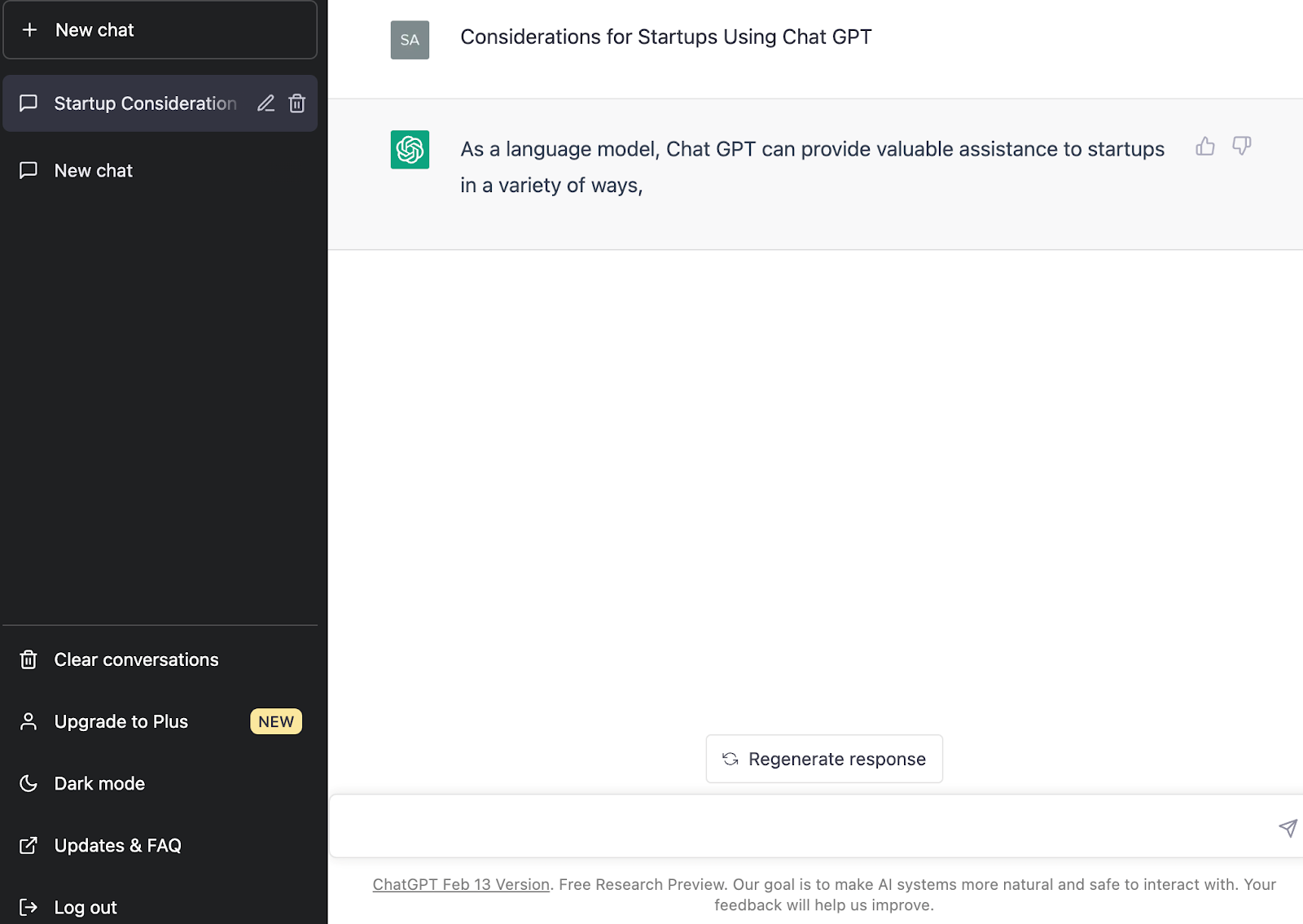By Sarah Litwin
BC Law EIC Student
April 2023
There are many reasons a startup should consider using ChatGPT. ChatGPT is an artificial intelligence (AI) chatbot developed by OpenAI. OpenAI is an American AI research lab consisting of the non-profit OpenAI Incorporated and its for-profit subsidiary corporation OpenAI Limited Partnership. ChatGPT presents exciting solutions for startups as well as challenges. Understanding the benefits and limitations of ChatGPT will assist startups in leveraging new technology to efficiently achieve goals.
What is ChatGPT? Chat Generative Pre-trained Transformer (ChatGPT) is a powerful tool that can help businesses automate customer service with tailored conversations. With a few typed instructions, ChatGPT can produce coherent text that imitates human-created work (see image below). With conversational capabilities, ChatGPT can be used for professional emails and to automate sales processes by assisting customers with product recommendations and quotes. Startups can implement ChatGPT or other forms of Artificial Intelligence into their platforms by using a third-party application, or by building a custom chatbot. By providing basic instruction, the system has the capability to suggest detailed ideas for content and social media posts. In fact, ChatGPT is already being utilized by State legislatures to protect the public’s safety, privacy, and intellectual property rights [1].
[2]
How can ChatGPT help startups? ChatGPT can be used by entrepreneurs to identify customer interests, including effective marketing strategies for small businesses [3]. AI Chatbots are also used to automate routine tasks and processes, such as sending emails or updating social media accounts [4]. To prepare for counseling a startup client, lawyers can use ChatGPT to generate options and prepare advantages or disadvantages of various solutions [5]. In addition, ChatGPT can compile research, train and hire interns or customer service staff providing startups with valuable monetary savings [6].
What risks are there to using ChatGPT? ChatGPT also exposes startup businesses to risks. One risk or open question surrounding ChatGPT and AI Chatbots is how the resulting work fits into copyright law. A key aspect of entitlement to copyright protection is authorship. The U.S. Copyright Office says that works must be created by a human author. While AI-based works are produced by human inputs, the output that constitutes the work itself is not created by humans. Thus, the use of ChatGPT is likely to lead to copyright issues and questions surrounding who is the rightful copyright owner of a work.
Creators commonly utilize digital technology to assist with copyrightable works, such as iPhones to create protected pictures, 3D processors to create sculptures, and tablets to draw images among others. There is a strong argument that if a human started the creative process for a particular work, it should be granted copyright protection. However, the amount of input generating the creative process warranting protection is unclear. There are also questions about which individuals or entity has the right to publish or exhibit AI-produced works.
ChatGPT may also raise significant privacy issues. Chatbots collect and process highly sensitive details. While conversations are not visible to other users, user data may require encryption and secure storage [7]. It is unclear to what extent protective measures may be incorporated into Chatbots and how to manage compromised information within these platforms.
Each of these concerns may lead to the emergence of litigation. To prepare for these potential issues, startups can set standards for inputs to ChatGPT. In particular, if a startup seeks copyright protection for a work partially produced with ChatGPT, they can demonstrate that their contribution to the work is greater than the result contributed by the new technology. Startups might also consider preparing liability waivers or click-wrap for consumers engaging with the Chatbot to minimize concerns of a privacy suit. These are just a few considerations an entrepreneur might consider when deciding whether to incorporate ChatGPT into their business.
ChatGPT is a disruptive technology that has already changed the context of startup environments. While artificial intelligence is here to stay, startups can and should consider the ethical implications of how these developments will affect their business. Moreover, startups looking to leverage artificial intelligence to build their business must give thought to the legal implications of integrating the new technology into their work.
[1] An Act drafted with the help of ChatGPT to regulate generative artificial intelligence models like ChatGPT, SD.1827, 193rd Gen. Assemb., Reg. Sess. (Ma. 2023), https://malegislature.gov/Bills/193/SD1827.
[2] ChatGPT conversation with author on March 10, 2023.
[3] 100 Valuable Chat GPT Prompts To Boost for Startups and Businesses, MEDIUM,
[4] 7 Great AI Opportunities for Any App Startup, by ChatGPT, PROTOTYPE.IO, https://prototypr.io/post/chatpgt-7-startup-ai-opportunities.
[5] See Neumann, “Part III: Counseling and Advice,” TRANSACTIONAL LAWYERING SKILLS, page, 54.
[6] Marr, B.,What Does ChatGPT Really Mean For Businesses?, FORBES, https://www.forbes.com/sites/bernardmarr/2022/12/28/what-does-chatgpt-really-mean-for-businesses/?sh=5428ae257d1e.
[7] How Can You Use Chat GPT For Your Small Business?, DREAMWORX,
https://dreamworxmarketing.com/blog/chat-gpt-for-small-business/.

